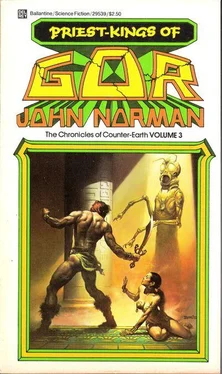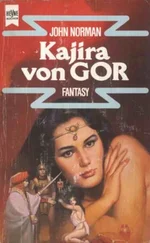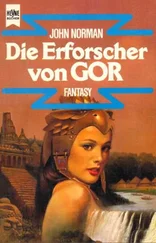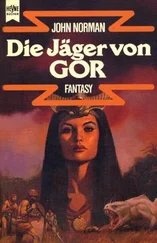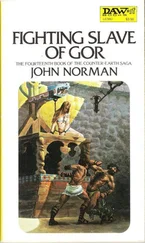Parp threw the tine tube away.
He looked at me. “Can you strike through to the heart of a larl?” he asked.
With a sword it would be a great blow.
“If I had the opportunity,” I said.
The second larl, enraged, roared and crouched to spring.
“Good,” said Parp, not flinching, “follow me!”
Vika screamed and I cried out for him to stop but Parp dashed forward and threw himself into the jaws of the startled larl and it lifted him its jaws and began to shake him savagely and I was at its feet and thrust my sword behind its ribs plunging it deep into its heart.
The body of Parp, half torn apart, neck and limbs broken, fell from the jaws of the larl.
Vika rushed upon it weeping.
I drew out the sword and thrust it again and again into the heart of the larl until at last it lay still.
I went to stand behind Vika.
Kneeling by the body she turned and looked up at me. “He so feared larls,” she said.
“I have known many brave men,” I said to her, “but none was more brave than Parp of Treve.”
She lowered her head to the torn body, its blood staining the silks she wore.
“We will cover the body with stones,” I said. “And I will cut robes from the pelt of the larl. We have a long way to go and it will be cold.”
She looked up at me and, her eyes filled with tears nodded her agreement.
Chapter Thirty Three
OUT OF THE SARDAR
Vika and I, clad in robes cut from the pelt of the snow larl I had slain, set out for the great black gate in the sombre timber palisade that encircles the Sardar. It was a strange but rapid journey, and as we leaped chasms and seemed almost to swim in the cold air I told myself that Misk and his Priest-Kings and the humans that were engineers in the Nest were losing the battle that would decided whether men and Priest-Kings might, working together, save a world or whether in the end it would be sabotage of Sarm, First Born, that would be triumphant and the world I loved would be scattered into fugitive grains destined for the flaming pyre of the sun.
Whereas it had taken four days for me to climb to the lair of Priest-Kings in the Sardar it was on the morning of the second day that Vika and I sighted the remains of the great gate, fallen, and the palisade, now little more than broken and uprooted timbers.
The speed of our return journey was not due primarily to the fact that we were now on the whole descending, though this helped, but rather to the gravitational reduction which made it possible for me, Vika in my arms, to move with a swift disregard for what, under more normal conditions, would have been at times a dangerous, tortuous trail. Several times, in fact, I had simply leaped from one portion of the trail to float more than a hundred feet downward to land lightly on another portion of the trail, a point which, on foot, might have been separated by more than five pasangs from the point about from which I had leaped. Sometimes I even neglected the trail altogether and leaped from one cliff to another in improvised short cuts. It was late in the morning of the second day, about the time that we sighted the black gate, that the gravitational reduction reached its maximum.
“It is the end, Cabot,” said Vika.
“Yes,” I said. “I believe so,”
From where Vika and I stood together on the rock trail, now scarcely able to keep our feet on the path, we could see vast crowds, robed in all the caste colours of Gor, clustered outside the remains of the palisade, looking fearfully within. I supposed there might have been men from almost all of Gor’s cities in that frightened, teeming throng. In the front, several deep, in lines that extended as far as I could see in both directions, were the white robes of the Initiates. Even from where we stood I could smell the innumerable fires of their sacrifices, the burning flesh of bosks, smell the heady fumes of the incense they burned in brass censers swinging on chains, hear the repetitious litanies of their pleas, observe their continual prostrations and grovelling by which they sought to make themselves and their petitions pleasing to Priest-Kings.
I swept Vika again to my arms and, half-walking, half-floating, made my way downward toward the ruins of the gate. There was a great should from the crowd when they saw us and then there was enormous quiet and every pair of eyes in that teeming throng was fixed upon us.
It suddenly seemed to me that Vika was a bit heavier than she had been and I told myself that I must be tiring.
I descended with Vika from the trail and, as I floated down to the bottom of a small crevice between the trail and the gate, the bottoms of my sandals stung when I hit the rock. I had apparently slightly misjudged the distance.
The top of the crevice was only about thirty feet away. It should take one leap and a step to clear it, but when I leaped, my leap carried me only about fifteen feet and where my foot scraped the side a pebble, dislodged, bounded downward and I could hear it strike the floor of the crevice. I took another leap, this time putting some effort into it, and cleared the top of the crevice by some ten feet to land between it and the gate.
In my heart something seemed to be speaking, but I could not dare to listen.
Then I looked through the ruins of the palisade and over the fallen gate, at the smoke from the countless sacrificial fires that burned there, at the smoke from the swinging censers. No longer did it seem to pop apart and dissipate. Now it seemed to lift in slender strands towards the sky.
A cry of joy escaped my lips.
“What is it Cabot?” cried Vika.
“Misk has won!” I cried. “We have won!”
Not stopping even to set her on her feet I now raced in long, soft bounds towards the gate.
As soon as I reached the gate I placed Vika on her feet.
Before the gate, facing me, I saw the astonished throng.
I knew that never before in the history of the planet had a man been seen to return from the Sardar.
The Initiates, hundreds of them, knelt in long lines to the crags of the Sardar, to the Priest-Kings. I saw their shaven heads, their faces distraught in the bleak white of their robes, their eyes wide and filled with fear, their bodies trembling in the robes of their caste.
Perhaps they expected me to be cut down by the Flame Death before their very eyes.
Behind the Initiates, standing, as befits the men of other castes, I saw men of a hundred cities, joined here in the common fear and plea to the denizens of the Sardar. Well could I suppose the terror and upheavals that had brought these men, normally so divided against one another in the strife of their warring cities, to the palisade, to the dark shadows of the Sardar — the earthquakes, the tidal waves, the hurricanes and atmospheric disturbances, and the uncanny lessening of the gravitational attraction, the lessening of the bonding that held the very earth together beneath their feet.
I looked upon the frightened faces of the Initiates. I wondered if the shaven heads, traditional for centuries with Initiates, held some distant connection, lost now in time, with the hygienic practices of the Nest.
I was pleased to see that the men of other castes, unlike the Initiates, did not grovel. There were men in that crowd from Ar, from Thentis, from Tharna, recognised by the two yellow cords in their belt; from Port Kar; from Tor, Cos, Tyros; perhaps from Treve, Vika’s home city; perhaps even from fallen, vanished Ko-ro-ba; and the men in that crowd were of all castes, and even of castes as low as Peasants, the Saddle Makers, the Weaves, the Goat Keepers, the Poets and Merchants, but none of them grovelled as did the Initiates; how strange, I thought — the Initiates claimed to be most like Priest-Kings, even to be formed in their image, and yet I knew that a Priest-King would never grovel; it seemed the Initiates, in their efforts to be like gods, behaved like slaves.
Читать дальше
